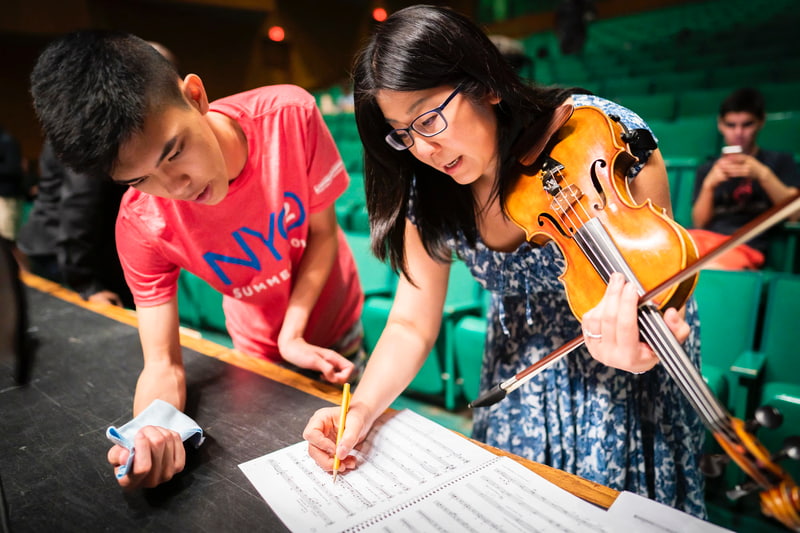The Weill Music Institute at Carnegie Hall produces an extraordinary range of music education and community programs. Each season, their work extends far outside the physical walls of the concert halls. These programs reach half a million people in New York City, across the U.S., and around the globe each season. Over more than ten years, the Institute has partnered with WolfBrown consultants to perform formative and summative evaluations. We’ve looked at many of its community-based programs. These programs reach people in healthcare and correctional systems, senior centers, homeless shelters, and other community settings.
In the process, WolfBrown has developed new forms of evaluation specifically targeted to these types of programs. These include surveys to measure the impact of very short term interventions. For example, we measured the impact of single performances in correctional settings. We’ve also taken on much longer term projects. For instance, we’ve looked at year-long song writing projects in health care settings and composition projects in prisons.
NYO2: Analyzing the Youth Instrumentalists of NYO2 Ensemble
Team: Dennie Palmer Wolf, Steven Holochwost, Henry Clapp, Haeun Moon, and Matthew Garcia

NYO2 (National Youth Orchestra 2) is comprised of outstanding young instrumentalists between the ages of 14-17 from across the United States. Participating musicians attend an intensive summer training and performance program. The program provides opportunities to work closely with top players from American orchestras and conservatories. They take part in a residency at Purchase College, State University of New York. To ensure the continued growth and diversification of the field, NYO2 has a particular focus on recruiting musicians from communities underrepresented in classical music.
Carnegie Hall and WolfBrown received a research grant from the National Endowment of the Arts. We are working with the staff, applicants, and participants in NYO2 to examine the program, its outcomes, and the implications for designing pathways to excellence for diverse young musicians. More specifically, WolfBrown team members have endeavored to collect and interpret application, acceptance, persistence, and promotion data from NYO2’s past participants and applicants. This includes analysis of application data and survey data as well as conducting onsite observations with students and teachers. We are speaking with students and capturing data related to their musical persistence. Thereby, the study aspires to understand what incubates or stymies a career in the arts.
To learn more about NYO2, visit their website.
The complete report is available for download here.
Lullaby Project: Assessing the Impact of Lullaby Music Making in the Lives of Young Children and their Families
Team: Dennie Palmer Wolf, Emma Terrell, Kate Anderson, and Todd Henkin with graduate students at West Chester University of Pennsylvania (Molly Murphy, Estefania Ortiz Ortiz, Edith Teffey)
About the project
An innovative methodology used computer analysis of the language to measure the impact of the Lullaby Project. This project helps new and expectant mothers write lullabies for their babies. Our evaluation work includes extensive observation, interviewing, participant surveys, and analysis of journals, recorded songs, and conversation. We have incorporated program sites across the country into our evaluation.
The Lullaby Project pairs pregnant caregivers, as well as young families, with professional artists. Together, they write and sing personal lullabies for their babies. This supports maternal health, aids childhood development, and strengthens the bond between parent and child. In New York City, the project reaches parents in healthcare settings, homeless shelters, high schools, foster care, and correctional facilities. In Philadelphia, throughout the pandemic, the project experimented with the design and implementation of intimate and caring spaces for caregivers and children.
WolfBrown has partnered with the project since its inception a decade ago. We have helped document the artistic and social-emotional impacts of the experience. Our work is part of an international network of participatory research and evaluation projects. Musicians, families, young children, family support organizations, and researchers are investigating the effects of music on family well-being and the growth of artists as partners in promoting families’ well-being.
An article published by the Inquirer in July 2023 shares more about the Lullaby Project’s Celebration Concert in June 2023. The full concert can also be viewed below:
Resources
The Lullaby Project offers free resources for families with babies and toddlers. Explore its collection of activities, videos, playlists, and more. The project focuses on how being creatively musical can benefit and support caregivers who are raising the next generation in today’s challenging world. It recognizes the vital and complex nature of their work.
According to Dr. Dennie Palmer Wolf, the project has improved bonding and understanding among participants. She has been conducting research on the Philadelphia Lullaby Project as part of an NEA Research Lab. Through the process, caregivers have gained a more complex understanding of their children. WolfBrown’s upcoming research shows that caregivers involved in the project feel more empowered. They also feel satisfied in their role and develop a better understanding of their children’s emotions and behaviors.
To learn more about current findings, read WolfBrown’s publications. You can read our report “Making a Joyful Noise: The Role of Music Making in the Well-Being of Families.” Or, you can look back at a report published in 2017, called “Lullaby: Being Together, Being Well”.
In 2016, working with musicians and staff at Carnegie Hall’s Weill Music Institute, Dr. Wolf published “Why Making Music Matters.” This booklet for families shows that investing in children early is critical to healthy development and a successful future. It also highlights the important role music can play in everyday interactions to support growth. In 2025, an updated version “Why Making Music Matters Now” was published.
Future Music Project & Musical Connections
Team: Dennie Palmer Wolf, Steven Holochwost
Future Music Project gives young musicians ages 14–19 from across New York City the opportunity to create, perform, and produce their own original music across all genres. In partnership with the Administration for Children’s Services, youth who are justice-involved create and learn about music through Future Music Project instruction, curriculum, and videos led by teaching artists.
In 2014, WolfBrown took on an evaluation of the impact of ensemble choral music-making on young people living in one of the most uncertain and stressful environments: the juvenile justice system. The project evaluated a choral residency program from Carnegie Hall’s Musical Connections program. The project was funded through the ArtWorks program at the National Endowment for the Arts. The complete report “Our Voices Count: The Potential Impact of Strength-Based Music Programs in Juvenile Justice Settings” is available.
In 2012, WolfBrown worked with Carnegie Hall to discover what Musical Connections had learned so far in this work. We did this by:
1) Examining the history and current reforms in juvenile justice
2) Reviewing the underlying research and evaluations conducted by other musical projects both in adult and juvenile corrections
3) Harvesting and reflecting on its own musical work in juvenile justice over the last three years.
The complete 2012 report “May the Songs I Have Written Speak for Me” is available for download here.
In 2011, WolfBrown produced a review of relevant literature. This included a discussion of important issues in the rapidly growing field of music and healthcare. The review has become a valuable resource for organizations and individuals alike. Read the 2011 report on music and healthcare.

